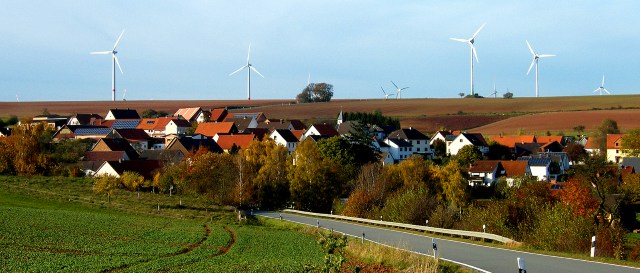According to a study published in January, only 29 citizen energy cooperatives were founded in Germany last year. The German Citizen Energy Alliance says the low number is a sign that the energy sector is being handed back to big business. Craig Morris investigates.

The Energiewende is a democratic movement – but the wind has turned for citizen cooperatives. (Photo by GLSystem, CC BY-SA 3.0)
First, let’s begin with a definition of cooperatives as the Germans understand them. As an American, I know that the term is understood differently elsewhere. In the US, cooperatives are a kind of utility, and they are not necessarily friendly towards renewables. Rather, they represent a kind of rural “municipal” utility, meaning that they are owned at least in part by the communities they serve, but these communities are often small towns. Such cooperatives often played a crucial role in bringing electricity to rural areas in the first half of the 20th century. They largely did so, however, with conventional energy, and some cooperatives have also bought into nuclear power. As a result, cooperatives in the US are sometimes openly hostile to renewables, which are viewed as a threat to stranded conventional energy assets (gas turbines, coal plants, nuclear plants, etc.).
In Germany, we need to make a distinction between municipal utilities and community ownership, with the latter often being called “cooperatives.” In Germany, Genossenschaften (the German word for cooperative) in the energy sector are almost always pro-renewables. At the beginning of the 1990s, citizens came together to invest in wind turbines, which were already getting too big and expensive for individuals. The first citizen energy co-ops were founded, however, as limited liability companies. A change in the law made it easier for citizens to found cooperatives as legal entities in 2006 – hence the increase in the number of citizen-owned projects listed as cooperatives in the chart below.

Although this chart is popular, I have become increasingly frustrated with it because it suggests that the cooperative movement is less than a decade old. In reality, most co-ops from the 1990s to the mid-aught years simply had a different legal form. With that in mind, let’s take a look at the situation in 2014.
Last summer, the umbrella organization for German energy cooperatives announced that the willingness of energy cooperatives to make further investments in the current year had already fallen from 92 percent in 2013 to 70 percent in 2014. The number of newly founded co-ops has also been on the decrease since the peak in 2011. By 2013, only 104 new energy co-ops had gone into business, compared to 183 in 2012 according to the latest figures from the Citizen Energy Alliance (press release in German). (A slight difference in the numbers reported comes about depending on whether we count those that have merely been founded or those that have already been “registered”, with the latter taking place 222 days after the former on average.)
The study behind the press release (PDF in German) explains that the main reasons are changes in the German Renewable Energy Act. The amendments of 2014 are the most drastic, but reductions in feed-in tariffs for photovoltaics back in 2012 also played a role.
The conclusion is quite dramatic. Existing energy cooperatives are increasingly pulling away from new investments. And fewer new energy cooperatives are being founded. At the end of 2015, it will be interesting to see how many terawatt-hours of new renewable electricity will have been added by citizens. The biggest share will come from offshore wind, a sector where citizen energy cooperatives are not active due to the high upfront investment costs.
Craig Morris (@PPchef) is the lead author of German Energy Transition. He directs Petite Planète and writes every workday for Renewables International.
Great commentary. I did my masters thesis on Denmark, Germany, and the UK with especial interest in RE co-ops. Perhaps there is a topping off process, no less.